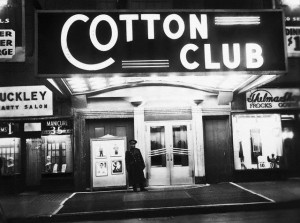(ThyBlackMan.com) The black students at The University of Michigan are in the fight of their lives. They are demanding that the university end a long reign of racial discrimination by allowing more African American students, hiring more black faculty members and allowing for a more diverse learning experience.
The students are speaking directly to a decline in black student enrollment and a host of other issues that have made their experience on campus less than inviting. These students join another “elite” institution, UCLA, in speaking out against the denial of African American students who don’t know how to throw a football.
Of course none of these diversity issues exist for UM when it comes to getting black people to run and jump to earn millions of dollars for the university by playing sports. The university’s football program earned $85 million dollars last year, largely on the backs of black athletes, many of whom would never be attending that university if they weren’t so amazingly profitable. Even Chris Weber, one of scores of black athletes who’ve earned millions for the school, admitted that he probably would not have been able to attend Michigan on scholarship if he weren’t a big black man who could dunk a basketball.
The Black Student Union at U. Michigan has been thoughtful and progressive in using the legacy of Dr. Martin Luther King Jr. to catapult them into 2014 with a commitment toward making change. They’ve even injected a little Malcolm X and Nelson Mandela into the dialogue, threatening “physical actions” if the campus doesn’t hear their demands.
Even though students have committed themselves to non-violent action, the university is still nervous about the idea of black people actually doing something to stand up for their rights. Like many campuses, I’m sure U. Michigan administrators are accustomed to black people passively complaining on Facebook about their situation, yet enduring their daily torture with a smile. After all, that’s what we’ve been trained to do.
complaining on Facebook about their situation, yet enduring their daily torture with a smile. After all, that’s what we’ve been trained to do.
Reactions to the protest online are mostly negative, but this comes with the territory. There is no black person in history who has made substantive change without receiving the kind of ugly, irrational feedback to be expected from a nation with a long history of hating black people. That’s just a fact. Truthfully, the mere mention of equality is likely to receive a backlash, because we’ve been second class citizens for so long.
White students at Michigan aren’t likely to appreciate what the black students are doing either. Many of them, because their education has not been a diverse one, are unable to understand why any black person would be dissatisfied with the state of affairs here in America. Even with a pile of statistical evidence supporting the black students’ assertions, they are going to be seen as “trouble-making negroes,” and disliked for the same reasons that most Americans hated Martin Luther King before he died. Unfortunately, the hateful students have been fed the version of history that leads them to believe that structural racism can be crushed by simply holding hands and singing “We shall overcome.” There is a REASON that black people are miseducated to be so passive: If we were to be taught even a fraction of our true history, we’d be much angrier than we are as a people (remember that story about black babies being used as alligator bait? They didn’t teach that one in your public school, did they?)
The problem is that confronting racism is just not as simple as just deciding that you won’t do it anymore. You see, The University of Michigan, along with nearly every other predominately white campus in America, spent decades designing its social, economic and academic infrastructure on a foundation of white superiority: The faculty are predominantly white, the most powerful administrators are white, and the curriculum is designed with white people in mind. African Americans have been added to most campuses as a relatively recent afterthought. Therefore, the pressure to assimilate is enormous, since the school is more likely to admit a student DESPITE the fact that he is black rather than appreciate him BECAUSE he is black. There is a difference.
After one spends this much time building such a distorted and oppressive reality, systematic racism is going to exist on that campus even if there isn’t a single racist in the building. The necessary solution is far deeper than simply getting white people to “be nice to us.” If you spend 30 years building a structure out of wood, it won’t turn into brick just because you stop adding wood to the building. Similarly, you can’t spend decades building a campus one way and expect the corrections to occur by themselves overnight. You have to tear something down and start the rebuilding process; that’s a physical fact.
So, what I recommend to the students at The University of Michigan is to remember one important rule of capitalism: Hit them where they make their money. That might mean working with athletes who are supportive to get them to boycott the team. It could also mean protesting at sporting events, especially the big ones, and possibly even disrupting the games by any means necessary. It may mean getting prominent recruits to walk away from the university, like the recent superstar running back (Damien Harris), who reversed his commitment to the school this week. Michigan’s love of the black athlete as a source of revenue provides glaring insight into the undeniable hypocrisy of admitting droves of black students to play sports, but telling their academically capable siblings that they are not good enough to attend the university.
The University of Michigan is a lot like the Cotton Club: Black people can perform, but they can’t sit in the audience. This is racism 101.
Staff Writer; Dr. Boyce Watkins
Dr. Boyce Watkins is the founder of the Your Black World Coalition. For more information, please visit http://BoyceWatkins.com.

















I live in Canada. My recommendation is that you have to emphasize on your HBCUs because in “White” colleges we are not assessed objectively and they can fail us to prevent us to get our PhDs and so on. I have proof to support what I am saying. One big example that I can give is Philip Emeagwali, the father of the Internet: http://en.wikipedia.org/wiki/Philip_Emeagwali#Court_case_and_the_denial_of_degree. He was prevented to get his PhD in the University of Michigan. The author of this article, Dr. Watkins is another proof. It is not normal that he was the only brother in the country who got his PhD in finance at his epoch. The favorite sport of many Whites is to fail us since the first grade. This is why very few of us are in fields where it is really possible to make serious money such as physicians, actuaries and so on.
I live in Canada. My recommendation is that you have to emphasize on your HBCUs because in “White” colleges we are not assessed objectively and rhey can fail us to prevent us to get our PhDs and so on. I have proof to support what I am saying. One big example that I can give is Philip Emeagwali, the father of the Internet: http://en.wikipedia.org/wiki/Philip_Emeagwali#Court_case_and_the_denial_of_degree. He was prevented to get his PhD in the University of Michigan. The author of this article, Dr. Watkins is another proof. It is not normal that he was the only brother in the country who got his PhD in finance at his epoch. The favorite sport of many Whites is to fail us since the first grade. This is why very few of us are in fields where it is really possible to make serious money such as physicians, actuaries and so on.
AMEN for this article! It is excellent!!!